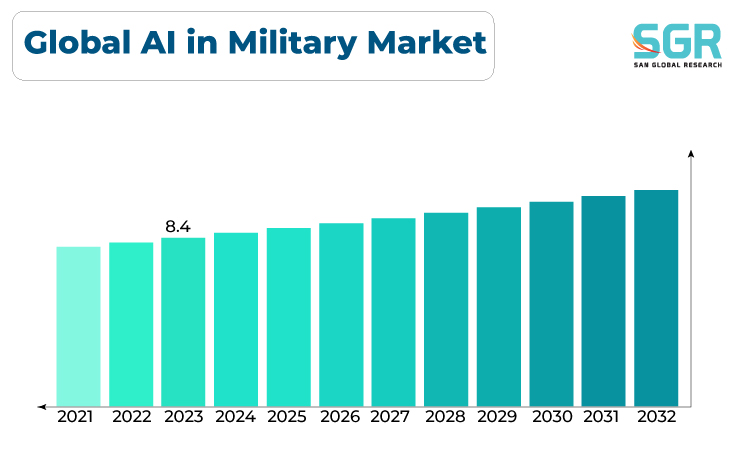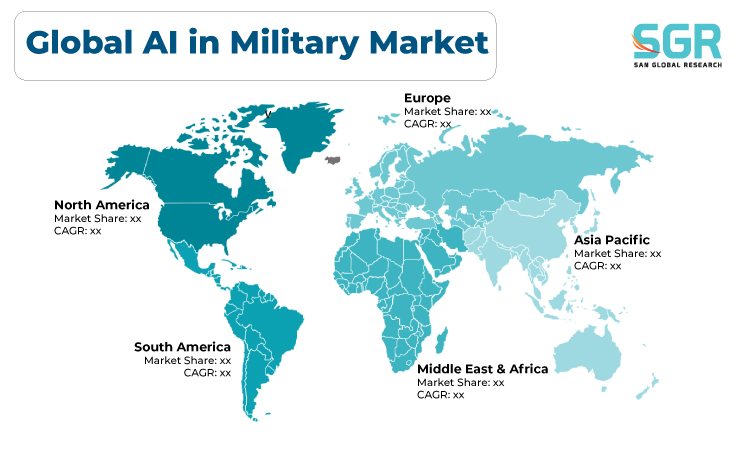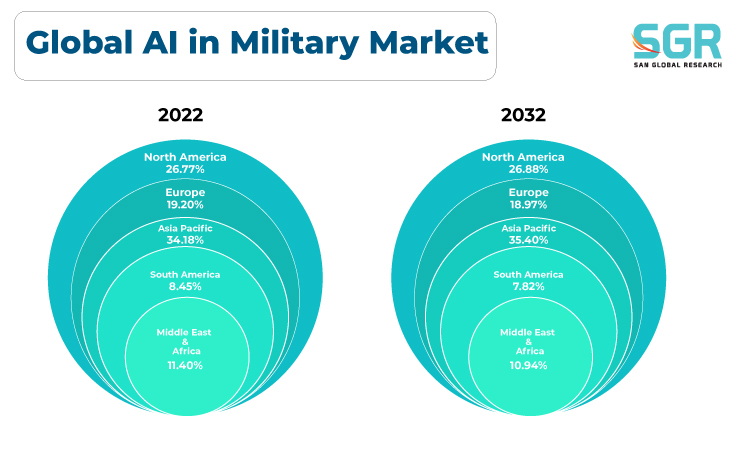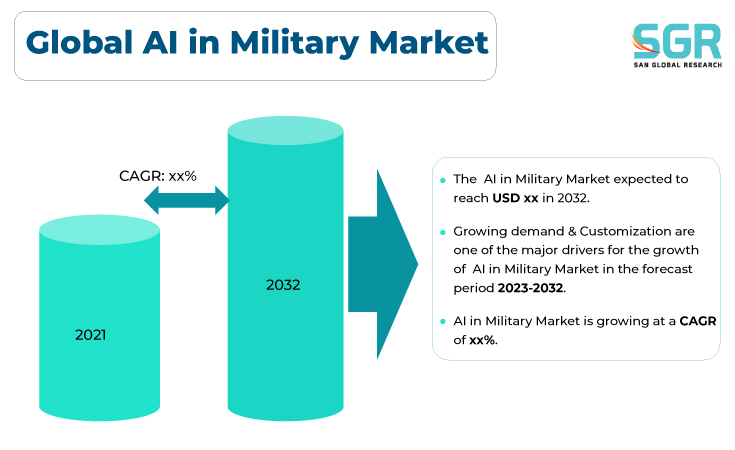Global Artificial Intelligence (AI) in Military Market is estimated to be worth USD 8.4 Billion in 2022 and is projected to grow at a CAGR of 30.4% between 2023 to 2032. The study has considered the base year as 2022, which estimates the market size of market and the forecast period is 2023 to 2032. The report analyzes and forecasts the market size, in terms of value (USD Billion), for the market. The report segments the market and forecasts it by offering, by application, by technology, by platform, by installation type and region/country.

The global AI in the military market is witnessing rapid growth and transformative advancements, reshaping the landscape of modern warfare. AI technologies are being extensively integrated into military systems and operations, offering enhanced decision-making capabilities, autonomous functionalities, and improved efficiency across various defense applications. AI-powered solutions, including autonomous vehicles, unmanned aerial vehicles (UAVs), intelligent command and control systems, predictive maintenance, cybersecurity, and battlefield analysis, are revolutionizing military strategies and capabilities. The utilization of machine learning algorithms and AI-driven analytics enables military forces to process vast amounts of data in real-time, facilitating quicker and more informed decisions on the battlefield. Moreover, AI's role in enhancing situational awareness, mission planning, and logistics optimization is fostering a more agile, adaptive, and technologically advanced defense sector globally, positioning AI as a cornerstone of future military innovation and preparedness.
Region Wise Comparison:
United States and Canada lead in the development and implementation of AI in military applications. The U.S. Department of Defense has been heavily investing in AI technologies for defense purposes, including autonomous systems, predictive maintenance, intelligence gathering, and cyber security. North American defense contractors and technology companies collaborate with the military to develop cutting-edge AI solutions for various defense needs, including drone technology, advanced surveillance, and logistics optimization.
Western European countries such as the UK, France, Germany, and others are actively investing in AI for defense and security purposes. There are collaborative efforts within the European Union (EU) to foster AI innovation in the defense sector. European nations are focused on leveraging AI for military applications like intelligence analysis, cyber security, autonomous vehicles, and enhancing situational awareness on the battlefield.

China has been making significant strides in AI for military applications, investing heavily in developing autonomous weapons systems, AI-powered drones, and leveraging AI for surveillance and reconnaissance purposes. Other countries in the Asia-Pacific region, including Japan, South Korea, and India, are also investing in AI for defense capabilities, with a focus on modernizing their military forces and adopting advanced technologies.
AI adoption in military applications in Latin America, Africa, and the Middle East varies significantly. Some countries in these regions are exploring AI for defense purposes, primarily focusing on surveillance, border security, and intelligence gathering. Economic constraints might limit the widespread adoption of advanced AI technologies in defense across these continents.

Segmentation
The Global Artificial Intelligence in Military Market is segmented by offering, by application, by technology, by platform, by installation type and region/country.
By Offering:
- Based on the offering, the Global Artificial Intelligence in Military Market is bifurcated into Hardware, Software & Services – where the Software is dominating and ahead in terms of share.
- In the realm of the global AI in the military market, software plays a pivotal role in driving innovation and shaping the capabilities of modern defense systems. AI-powered software applications are instrumental in revolutionizing military operations, offering sophisticated solutions for data analysis, decision-making, autonomous functionalities, and cyber security within defense frameworks.
- Additionally, AI-driven software aids in enhancing situational awareness, facilitating complex simulations for training purposes, optimizing logistics, and strengthening cyber security measures to counter evolving threats in the digital battlefield.
By Application:
- Based on the Application, the Global Artificial Intelligence in Military Market is bifurcated into Warfare Platforms, Cyber security, Logistics & Transportation, Surveillance & Situational Awareness, Command & Control, Battlefield Healthcare, Simulation & Training, Target Tracking & Monitoring, Information Processing & Others – where Warfare Platforms is dominating and ahead of Software in terms of share.
By Technology:
- Based on the Technology, the Global Artificial Intelligence in Military Market is bifurcated into ML, NLP, Context Aware Computing, Computer Vision, Intelligent Virtual Agent and Others – where the ML is dominating and ahead of others in terms of share.
By Platform:
- Based on the Application, the Global Artificial Intelligence in Military Market is bifurcated into Air Borne, Land, Naval & Space – where the Air Borne is dominating and ahead of others in terms of share.
By Installation Type:
- Based on the installation Type, the Global Artificial Intelligence in Military Market is bifurcated into New Installation & Up gradation – where the New Installation is dominating and ahead of others in terms of share.

On the basis of Region
- North America
- Europe
- Asia Pacific
- South America and
- Middle East and Africa
In 2022, North America is anticipated to dominate the Global Artificial Intelligence in Military Market with market revenue of XX USD Million with a registered CAGR of XX%.
Key Players:
The key market players operating in the Global Artificial Intelligence in Military Market include
- LOCKHEED MARTIN CORP.
- RAYTHEON TECHNOLOGIES
- NORTHROP GRUMMAN
- BAE SYSTEMS
- THALES GROUP
- L3 HARRIS
- RHEINMETALL AG
Drivers:
Growing sector across the globe
The burgeoning landscape of AI in the military market is propelled by several key drivers that underscore its evolution and widespread adoption. Technological advancements stand as a cornerstone, offering sophisticated AI capabilities that revolutionize military strategies and operations. AI-driven solutions, including autonomous systems, predictive analytics, and intelligent algorithms, cater to enhanced decision-making, autonomous functionalities, and improved efficiency in defense applications. The increasing need for more agile and technologically advanced military capabilities, including unmanned systems, advanced surveillance, cybersecurity, and data-driven intelligence, fuels the integration of AI technologies into military systems. Moreover, geopolitical tensions and the growing emphasis on maintaining a competitive edge in defense infrastructure further drive investments and initiatives in AI research and development within the military sector. As AI continues to demonstrate its potential in optimizing defense capabilities and enabling strategic advantages, it stands as a pivotal force shaping the future landscape of military operations and readiness globally
Opportunity:
Evolving Market
The AI in the military market presents an array of compelling opportunities poised to revolutionize defense capabilities and strategic initiatives globally. One significant opportunity lies in the advancement of autonomous systems and unmanned vehicles, allowing for precise and efficient operations while reducing risks to human personnel. AI-powered predictive analytics and data-driven decision-making offer another avenue for enhancing situational awareness, enabling quicker and more informed responses in dynamic and complex combat scenarios. Furthermore, the integration of AI in cyber security measures presents an opportunity to fortify defense systems against evolving cyber threats, ensuring robust protection of sensitive military data and infrastructure. Additionally, the utilization of AI-driven simulations and training programs enables realistic and immersive training experiences, facilitating skill development and preparedness among military personnel. Collaborative efforts between defense contractors, technology firms, and military organizations are fostering innovation, pushing the boundaries of AI applications in defense, and unlocking new possibilities to strengthen national security and defense capabilities on a global scale.


 Description
Description

 Gera Imperium Rise,
Gera Imperium Rise,  +91 9209275355
+91 9209275355


